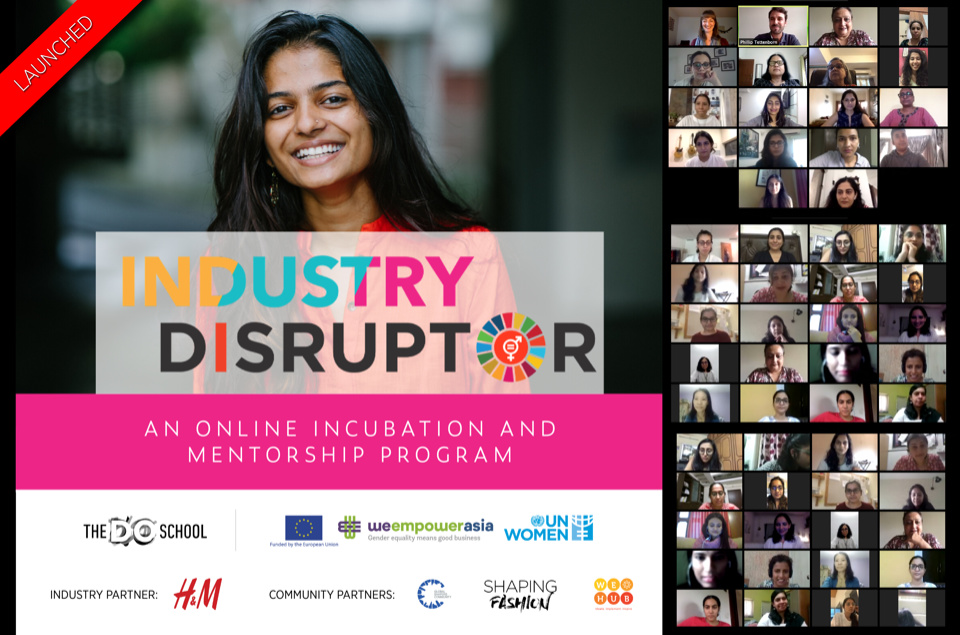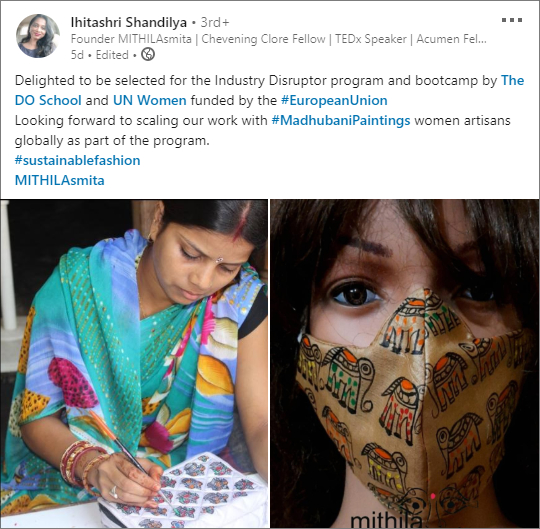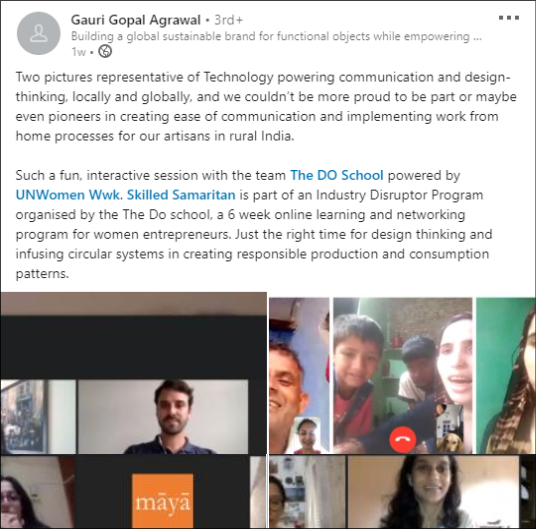India’s companies making big waves in the fashion industry
Date:
Author: Suhela Khan, Bovornpong Vathanathanakul

Entrepreneurs of all genders and fashion brands in India are streamlining innovation to tackle pressing sustainability issues through the Industry Disruptor Challenge.
New Delhi, India – More than 70 companies passionate about gender equality and eager to make more sustainable and women-benefiting fashion in India came together for a webinar hosted by UN Women as part of the Industry Disruptor Challenge.
Launched in May 2020, the Industry Disruptor is UN Women’s incubation and mentorship program that provides entrepreneurs in India the chance to learn from leading industry experts and scale solutions sustainably within the fashion supply chain.
UN Women launched the online training of India’s top 80 finalists on July 15 with the support of The DO School. The training will run for 6 weeks ending on August 19, with a mix of weekly webinar sessions and ongoing knowledge exchange in a robust peer community (see full list below).
Twenty of the most promising ventures will be selected from the participants and will go through a bootcamp training and initial co-creation with industry and corporate partners that include H&M, Tchibo and WE HUB. The 3-month support program will cover business development strategy, market access and mentorship.
During the discussion, the company representatives discussed their vision, purpose and actions they can take to scale and co-create products and solutions for impact. They also discussed how the joint European Union-UN Women programme WeEmpowerAsia can help them stand out and scale up in this fast-growth market. The EU-funded programme promotes women’s economic participation and business opportunities in seven Asian countries, including India.
The training, held on World Youth Skills Day, also highlighted the need for entrepreneurs to reskill and upskill, as well as to strengthen links between European and Asian markets through the Women’s Empowerment Principles (WEPs) and gender-sensitive trade and supply chains.
UN Women’s WeEmpowerAsia Regional Programme Manager Katja Freiwald has said: “We believe the Industry Disruptor project can boost India’s entrepreneurial ecosystem, promote innovation in the county and contribute new solutions that the fashion industry of the future will require.”
“Unlocking the potential of women entrepreneurs is not only going to bring major benefits to businesses but will be a powerful driver of development and bring society closer to the Sustainable Development Goals, particularly Goal 5 on gender equality,” added Freiwald.
According to India’s Sixth Economic Census, only about 14 per cent of women own or run businesses; more than 90 per cent are microenterprises and about 79 per cent are self-financed.
With the government making all-out efforts to stimulate entrepreneurship and innovation, more female entrepreneurs are emerging in India and breaking the glass ceiling across industries. Yet within the fashion supply chain, many women continue to be underrepresented in leadership roles and continue to face persistent discrimination which has been exacerbated by the COVID-19 crisis.
Katherin Kirschenmann, Founder of The DO School, has stated: “The effects of COVID-19 on the entire fashion industry, including its international supply chains and its predominantly female workforce, are huge and are adding to the already-existing sustainability challenges faced by the industry. I think this project is an opportunity to forge new coalitions to better resolve the problems together. With the Industry Disruptor we will focus on joint solutions and sharing best practice.”
Katherin added that the project takes a facilitative approach to strengthen the entrepreneurial ecosystem, which will include skill-building and networking opportunities for women, and the advocacy and promotion of renewed perspectives and value to women-led enterprises and solutions.
Nishtha Satyam, Deputy Country Representative of UN Women India, highlighted the importance of this engagement: “In India, women entrepreneurs are demonstrating and proving their talent, capability to innovate and high capacity for risk in every sector—traditional and non-traditional. With programs like the Industry Disruptor, our aim is to promote an inclusive business environment and equip them with skills to create and lead gender responsive enterprises."
To date, the Challenge has garnered overwhelming response from entrepreneurs of all genders in India with more than 300 applications received. Up to 85 applicants will be selected for training; 20 will qualify for the bootcamp.
For more information about the Challenge, please visit: http://bit.ly/industrywea
Join the conversation by using the hashtag #IndustryDisruptor and follow @UNWomenAsia on Facebook and Twitter for updates.
List of online training sessions (July 15-August 19, 2020):
- July 15 - Industry Disruptor online training sessions (vision, purpose and impact)
- July 22 - Industry Disruptor online training sessions (fashion and sustainability)
- July 29 - Industry Disruptor online training sessions (gender equality and operations)
- August 5 - Industry Disruptor online training sessions (crisis management and resilience)
- August 12 - Industry Disruptor online training sessions (marketing and engaging customers)
- August 19 - Industry Disruptor online training sessions (funding, collaboration and scaling)
Related news:
UN Women and WE HUB to Catalyze India’s Fashion Industry
Entrepreneur Voices
For media enquiries, please contact:
- Suhela Khan
Country Programme Manager, WeEmpowerAsia India
UN Women India
Email: suhela.khan@unwomen.org - Bovornpong Vathanathanakul
Communications Analyst, WeEmpowerAsia
UN Women Regional Office for Asia and the Pacific
Email: b.vathanathanakul@unwomen.org
About Industry Disruptor
The Industry Disruptor project is a collaborative effort between UN Women and The DO School mobilizing female entrepreneurs and female-led enterprises in India to tackle key sustainability challenges in the textile and fashion industry. The project is part of a wider initiative of the WeEmpowerAsia (WEA) programme, which is funded by the European Union under its Partnership Instrument and implemented by UN Women Regional Office for Asia and the Pacific.
About UN Women
UN Women is the United Nations entity dedicated to gender equality and the empowerment of women. A global champion for women and girls, UN Women was established to accelerate progress on meeting their needs worldwide.
About the European Union
The European Union is made up of 27 member States who have decided to gradually link together their know-how, resources and destinies. Together, during a period of enlargement of 50 years, they have built a zone of stability, democracy and sustainable development while maintaining cultural diversity, tolerance and individual freedoms.
About The DO School
The DO School is a global organization that enables a purposeful economy that is sustainable and innovative. They are powered by a community of Doers, innovators, and experts from 100+ countries. Through their unique methodology, they support individuals and organisations to transform with purpose: To turn co-created ideas into action, equip people to lead and build movements, and create real change. For more: https://www.thedoschool.com
About WeEmpowerAsia
WeEmpowerAsia, a programme funded by and in partnership with the European Union seeks to increase the number of women who lead and participate in business in China, India, Indonesia, Malaysia, the Philippines, Thailand and Viet Nam. A key component of the programme is to mobilize private sector companies to become gender-responsive by committing to and implementing the Women’s Empowerment Principles (WEPs). For more, visit www.weempowerasia.org.
About the Women’s Empowerment Principles
The Women’s Empowerment Principles is a joint initiative of UN Women and the UN Global Compact. The Principles outline seven steps for business on how to empower women in the workplace, marketplace and community. The Principles highlight that empowering women to participate fully in economic life across all sectors and throughout all levels of economic activity is essential to build strong economies; establish more stable and just societies; achieve internationally agreed goals for development, sustainability, and human rights; improve quality of life for women, men, families and communities; and propel business’ operations and goals. For more: https://www.weps.org/about

